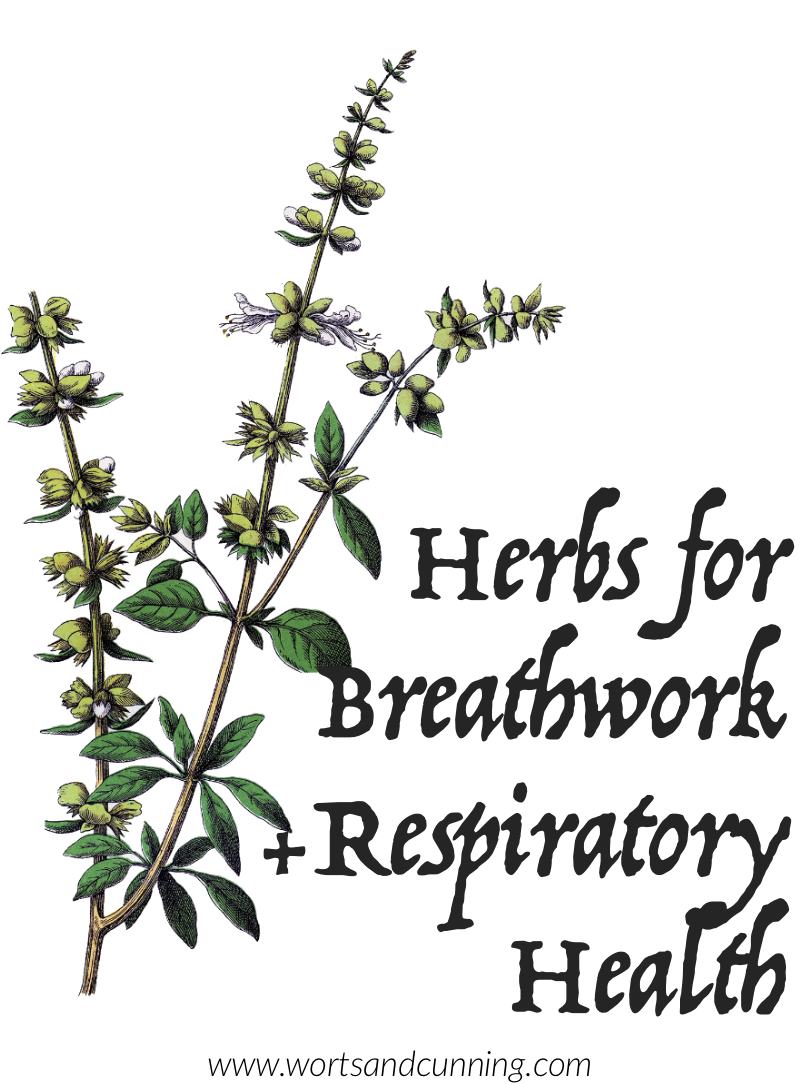Herbs for Breathwork + Respiratory Health
Last month I wrote about how breathwork is a community tool and works in online spaces (thank the Holy Ones for transcendent digital magick). I wanted to follow-up that post with suggested herbs that can assist us in our breathwork but are also useful for respiratory health in general. We're in the midst of protest season which is looking like it's going to be an appropriately long one also while living through a pandemic. Respiratory health, whether we're being exposed to viruses or chemicals like pepper spray and tear gas, is really important right now. Breathwork combined with attention to the bodily systems which help us breath helps us to return home to our bodies and nourish our nervous system after prolonged periods of stress. You can combine these herbs not only with your breathwork but with other centering and body-grounding practices like healing movement modalities, therapy and mental health practices, walking, sex and sensual touch, ritual and spellcraft, and more.
I've listed four categories of herbs that I think are particularly useful for breathwork: Nervines, Adaptogens, Respiratory Tonics, and Heart Tonics. There are so many herbs present in each of these categories that I could recommend but hopefully by describing the types and qualities of herbs I recommend you'll be able to find ones that you are already familiar with, that are stocked in your cabinet, and/or more regionally relevant.
I'll follow these categorical descriptions with short profiles on eight herbal allies that I've been turning to frequently these days. Since these are just short descriptions of each herb, it is important for you to do your research with reliable materia medicas and consult with herbalists for further information, contraindications, and stories that will deepen your relationship with our plant friends. Of course, when you are able to, meet these plant allies in spaces where they grow and ask to sit with them to learn directly from their wisdom.
The Four Categories of Breathwork Herbs
Nervines are plants that calm the nerves and often nourish the nervous system. Since so much of breathwork is about interacting with our nervous system in healing and beneficial ways, helping us to return to a state of rest and digest, nervines are beautiful companion herbs and guides in our practice. They help us to relax and open up to breathing deep and purposefully. So many of our diseases and ailments either have roots in or are exacerbated by stress which is why knowing and working with nervines not only in breathwork but in daily life can be of such great benefit to us. Nervines include Milky Oat (Avena sativa), Lavender (Lavandula spp.), Holy Basil (Ocimum spp.), Chamomile (Matricaria chamomilla), Skullcap (Scutellaria lateriflora), Lemon Balm (Melissa officinalis), and Catnip (Nepeta cataria).
Adaptogens are herbs that do a multitude of healing actions, but are probably known most popularly as helping us to adapt to stress. Adaptogens and nervines work well together and when it comes to breathwork, adaptogens can help us stretch back into ourselves after a period of prolonged stress. It's important to remember that adaptogens don't "cure" stress and are not meant to replace stress-reducing actions and choices in our lives from healthy movement to mindful consumption. And also, the reality is that many of us are dealing with tremendous social and political stress in our lives further impacted by global environmental changes. Adaptogens can help us develop a sense of resiliency and purpose so we are less distracted by stress and more invested in the tools which help us (such as breathwork) continue on in life with a feeling of wholeness and purpose. Some adaptogens are Eleuthero (Eleutherococcus senticosus), Holy Basil (Ocimum spp.), Reishi (Ganoderma lucidum), Ashwagandha (Withania somnifera), Gotu Kola (Centella asiatica) and Rhodiola (Rhodiola rosea). The following wisdom from Toni Morrison from a talk at Portland Statue University in 1975 feels like an adaptogenic one to me, helping to tell the story of these plants:
“The function, the very serious function of racism is distraction. It keeps you from doing your work. It keeps you explaining, over and over again, your reason for being. Somebody says you have no language and you spend twenty years proving that you do. Somebody says your head isn’t shaped properly so you have scientists working on the fact that it is. Somebody says you have no art, so you dredge that up. Somebody says you have no kingdoms, so you dredge that up. None of this is necessary. There will always be one more thing.”
Of course, if we're talking about herbs to support respiratory health, I'm going to feature Respiratory Tonics. These include herbs which can be immunostimulating (since the respiratory system is an primary entry way for viruses and bacterias) as well as decongestants, demulcents (herbs that moisten mucous membranes), and expectorants (herbs that relax lungs while promoting elimination of mucus from airways). Many respiratory tonics are also considered aromatics - herbs that are rich in volatile oils and deeply scented. Aromatics often do all the actions I just described for respiratory tonic herbs and have a wonderfully harmonizing or synergizing energy which helps to bring a blend together as well as helping a tea taste better. Respiratory tonics herbs include Mullein (Verbascum thapsus), Elecampane (Inula helenium), Licorice, Nettles (Urtica dioica), Thyme (Thymus vulgaris), Goldenrod (Solidago spp.), Wild Cherry Bark (Prunus serotina), and Pleurisy Root (Asclepius tuberose).
I also include Heart Tonics in my recommendations. In my experience, so much of breathwork is heart work. Yes, the benefits of mindful and meditative breathing are many - it is calming to our nervous systems, lower blood pressure, stimulate our immune systems, shift emotional and mental perspectives, disrupt anxiety and panic attacks, and so on. It is not unusual during breathwork and working with our respiratory system in general for there to be a feeling of opening, expanding, and along with that, grieving for un-grieved for experiences. Heart tonics help us to open our hearts with support (many heart tonics are protective along with being opening) and make space for grief to move through and out of our bodies instead of stagnating. Herbs include Hibiscus (Hibiscus sabdariffa), Hawthorn (Crataegus monogyna), Rose (Rosa spp.), and Motherwort (Leonurus cardiaca).
So sitting in the center of our circle, we sit with our backs against the tree of life, calling to us respiratory tonics from the east, nervines from the west, adaptogens from the south, and heart tonics from the north. Let's meet our plant allies gathered here...
Herbs for Breathwork + Respiratory Health
Mullein (Verbascum thapsus) | Respiratory Tonic, Nervine
Mullein is great for all sorts of lung-related complaints from asthma to bronchitis, the herb opens the respiratory passageways helping us to breathe deeper and more effectively. It's a demulcent which also reduces inflammation and helps to protect against infection. Mullein is one of my favorite herbs for fire season here in California. Overall, it helps us to release tension from our bodies. Within breathwork, Mullein is good for those type of folks who overwork and stretch themselves thin - the herb helps them to soften and open up to relaxing as an act of justice and repair.
Elecampane (Inula helenium) | Respiratory Tonic, Heart Tonic
I've written a full plant profile on Elecampane and it is a well-regarded lung tonic in traditional western herbalism. The herb is an astringent decongestant as well as being antiseptic and antibacterial. It is really useful for treating chronic coughs and long-term lung complaints. Elecampane, also known as Elf Wort, has a traditional use for "elf shot" in Celtic culture which can be interpreted as a number of ways one of which is as a sudden energetic and emotional pain brought on by a traumatic event. Drop dosages of the herb or flower essence can be really helpful in cases like this. For breathwork, Elecampane is a helpful ally for those who are coming to the practice after a shock-inducing experience.
Yerba Santa (Eriodictyon californicum) | Respiratory Tonic, Nervine
Yerba Santa is an astringent decongestant that dries up excess mucous by normalizing excess mucous secretion. Normalizing mucous secretion means that you won't have to go back and forth between too much and too little secretion leading to being too dried out and equally uncomfortable. Along with Mullein it is also one of my favorite herbs for fire season here in California. In addition to its powers of mucous normalization, Yerba Santa is antimicrobial and antiseptic. On an energetic level, Yerba Santa sticky resinous quality helps to pull up and out old grief and trauma so that you no longer have to carry it around. For breathwork, it can be helpful if you struggle with breathing out deeply.
Thyme (Thymus vulgaris) | Respiratory Tonic
Thyme is one of my favorite kitchen garden remedies - I always have the fresh herb growing in my garden or at least dried leaves in my spice cupboard. I add it to most of my respiratory tonics because it is pleasing in taste and effective in its actions as a decongestant expectorant. Thyme strengthens the immune system without being over-stimulating and protects against bacterias and microbes. It is one of my favorite allies in removing respiratory infections from the body and one I turn to often in the winter months. Thyme is not classically categorized as a nervine, but it certainly acts like one, helping to relieve tension and mental exhaustion. For breathwork, beyond being wonderfully aromatic and enhancing the physical breathwork experience, Thyme helps us to settle into our practice while gathering our inner resources and loosening our belief that there is not enough time for all the work that needs to be done.
Plantain (Plantago spp.) | Respiratory Tonic
Ubiquitous Plantain is commonly used in traditional western herbalism for topical treatments but in recent herbs I've come to know the plant for its respiratory tonic qualities. I live in fire country and have started working with Plantain as a smoke relief ally. Plantain heals tissue internally as well as it does externally which is especially useful for healing post-exposure to environmental pollutants and chemical weapons such as pepper spray and tear gas. For breathwork (and any sort of mindful practice or magick), Plantain helps us remind us of the abundant truth that simple practices cultivate profound peace.
Holy Basil (Ocimum spp.) | Respiratory Tonic, Adaptogen, Nervine
Holy Basil, also known as Sacred Basil and Tulsi, is an antispasmodic demulcent and expectorant. The herb is immunostimulating and protective against microorganisms like Staph infection. It's a lovely warming plant and one of my favorite adaptogens helping to reduce anxiety while uplifting the spirit and sparking hope within us. Of course, I have a personal love for Holy Basil that is tied to the lessons I have learned sitting with this plant and its ancestral stories, but I can't help but feel that the recognition of Holy Basil as an earthly embodiment of the Goddess Lakshmi speaks to the sacredness that Holy Basil helps us to recognize in people and places. Within breathwork, Holy Basil helps us to connect to our holiness and the holiness of the moment while releasing those things which no longer serve us. Here is one of my favorite tea blends featuring Holy Basil.
Hawthorn (Crataegus monogyna) | Respiratory Tonic, Heart Tonic
Holy heart opener and guardian of the gates, Hawthorn is one of the most treasured heart tonics within traditional western herbalism. I've written about its power of thorn, how it helps us to thrive in eclipse season, and why it is one of my favorite autumn season herbs. Hawthorn is known as a cardiac tophorestorative which means that it acts as a restorative for our heart bringing our physical and energetic heart back into balance. The herb helps with the brave journey of opening up again after heartbreak - no easy task and yet one essential to healing. In breathwork, Hawthorn is the ally of the broken-hearted and those who avoid quiet contemplative practices because of their broken-heartedness. It is an herb that works best when taken over an extended period of time.
Rooibos (Aspalathus linearis) | Nervine, Heart Tonic
Rooibos is a relaxing nervine with anti-spasmodic qualities and cardioprotective qualities. It's one of my favorite herbs to use in daily morning teas - it's a gentle adaptogen, rich in antioxidants, incredibly calming to the nerves without being sedating, and it's just a really delicious tasting. Rooibos finds its way into many of my tea blends include this one for the First Harvest. Plants are storytellers and in this current wave of culture-changing Black Lives Matter protests, South African native Rooibos can act as an ancestral teacher and gifter of wisdom. For those of you of African descent wanting to work with ancestral herbs, Rooibos is one place to start since it is often easy to find and gentle enough for most folks to work with. For folks of non-African descent we can learn from plants like Rooibos, too, practicing our listening skills and turning to quiet reflection with our plant teachers alongside the many other humxn teachers helping us to dream up a more just and kind future. Within breathwork, Rooibos helps us bring sweetness to our practice especially for those folks who have a hard time recognizing pleasure as an essential part of healing and justice work.
Recommended Preparations
Many of the herbs above can be prepared in a variety of ways. I feel that the following three ways are particularly conducive to using these herbs in breathwork practices, but please use what you have available and what is appropriate for your individual needs. All of these preparations are water based and require very simple tools to make.
Teas: One of our oldest forms of herbal medicine, teas or herbal tisanes - if we want to get fancy - are the infusion of plant material with water. Sitting with a cup of tea before, during, and after breathwork only enhances the experience in my opinion. Making tea can be a ritual, helping to set the space for your breathwork and, if drinking hot tea, the steamy aroma of the brew can further help to open airways and deliver the medicine through our breath. Typically, for herbal teas you’ll add 1 heaping teaspoon of herbs per 8 ounces of water and steep for 10 - 20 minutes.
Herbal Steams: Opening up the airways and delivery herbal medicine directly to our airways can be a lovely way to connect with plants before and during breathwork. Typically an herbal steam consists of pouring hot water over a bowl full of herbs and positioning your head above it so that you are breathing in the vapors. Some folks like to cover their head and the bowl with a towel, but this can be a bit too intense for others. It is important to be careful and not burn yourself with the steam which can be quite hot initially. I like to pour hot water over a bowl of herbs, cover with a towel and let sit for 5 minutes before breathing it. You can perform an herbal steam before breathwork or have a bowl of herbs and hot water positioned before you so that you are inhaling their fragrance while partaking in your breathwork practice.
Herbal Baths + Showers: Another option is to take an herbal bath or shower. Herbal baths consist of infusing your bathwater with herbs much like bathing in a large cup of tea. You can learn more about herbal baths and showers here. I like combining herbal baths and showers with breathwork because I find them inherently relaxing and opening - both energetic shifts useful for breathwork. While you can take an herbal bath or shower and then perform your breathwork, you can also perform simple and short breathwork while bathing. As a Witch, bathing is an opportunity for spiritual cleansing and releasing unwanted energetic entanglements - combined with herbs and breathwork bathing and showering can become a powerful ritual.
I hope that these suggestions are useful and that you are inspired to meet with any one of these plant teachers yourself. Be sure to check out my companion post on breathwork for more resources. If you're looking for more resources on herbs that help remind us of our wholeness check out my post on work and worth and those plant allies that are especially useful for the more sensitive among us. Since breathwork is often connected to (re)learning how to rest, here's my guide on how to find insights on ways to rest particular to your personal starmap.
If you’re looking for a deeper dive into breathwork, check out my course on the subject.
Finally, I just received a book in the mail today that I think many of you would find useful when it comes to the overall practice of arriving back into our bodies. Nourishing the Nervous System by tayla shanaye is a beautifully designed pocket-sized book (can I tell you of my deep love for pocket books?) with simple somatic exercises you can do daily for nervous system wellness. The book is produced by Loam which I was only recently introduced to (thanks, Yarrow!) and I’m sure many of you will be as happy to find them as I was.
❤︎ This post was made possible through patron support. Thanks, friends. ❤︎































